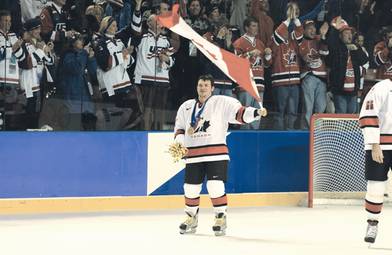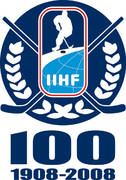

Story #11 Canada wins Olympic gold for first time in 50 yearsFebruary 24, 2002—Salt Lake City, USA
After the great disappointment of Nagano, when Canada failed to win a medal despite a tremendous lineup and gold-medal expectations, Canada was leaving nothing to chance four years later. Wayne Gretzky, who was not selected in the shootout against the Czechs in 1998, had retired and been named Canada’s general manager, and he surrounded himself with a roster of executives unlike anything in Canada’s hockey history. Collectively, they chose the 20 skaters and three goalies who would try to bring their country Olympic glory for the first time since 1952.  Tony Amonte drew first blood in the final game of the 2002 Olympic hockey tournament, giving the Americans a 1-0 lead midway through the first period. Paul Kariya tied the game a few minutes later on a brilliant play by Mario Lemieux. Chris Pronger passed Lemieux the puck, and he made the motion to one-time a shot. But, instead of shooting he let the puck go past him and onto the stick of Paul Kariya. Kariya had a wide-open net as goalie Mike Richter had positioned himself to stop Lemieux’s shot. Jarome Iginla put Canada up 2-1 late in the period, and the lead lasted most of the second. About the Top 100 StoriesAs part of the IIHF's 100th anniversary celebrations, www.IIHF.com is featuring the 100 top international hockey stories from the past century (1908-2008). Starting now and continuing through the 2008 IIHF World Championships in Canada, we will bring you approximately three stories a week counting down from Number 100 to Number 11.
The Final Top 10 Countdown will be one of the highlights of the IIHF's Centennial Gala Evening in Quebec City on May 17, the day prior to the Gold Medal Game of the 2008 World Championship.
These are the criteria for inclusion on this list: First, the story has to have had a considerable influence on international hockey. Second, it has to have had either a major immediate impact or a long-lasting significance on the game. Third, although it doesn't necessarily have to be about top players, the story does have to pertain to the highest level of play, notably Olympics, World Championships, and the like. The story can be about a single moment — a goal, a great save, a referee's call — or about an historic event of longer duration — a game, series, tournament, or rule change. |
 Click here for the 100 Top Stories
|
|






